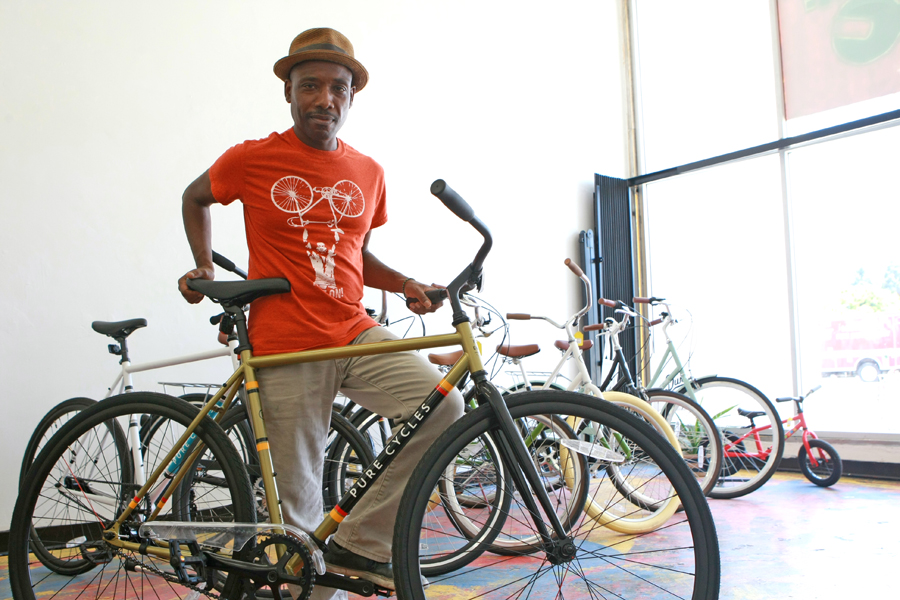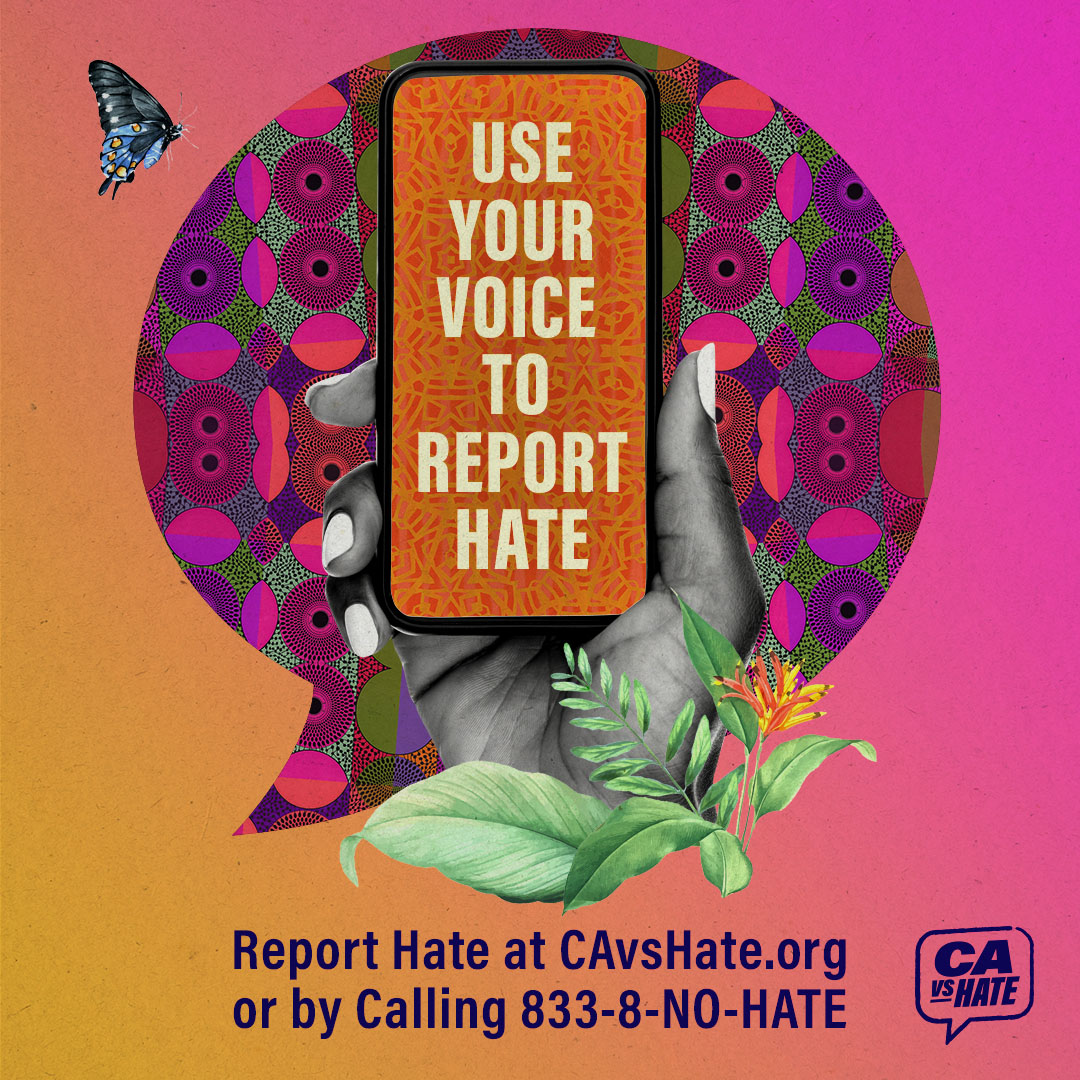The Black Cooperative Investment Fund raises money through community donations and reinvests the funds to small-business owners.

Ade Neff, owner of Ride On Bike Co-Op in Leimert Park, has taken advantage of a BCIF loan.
By Megan Reed
Many of the financial struggles that have plagued Black communities for several decades can be attributed to the lack of business and home ownership of Black people. In terms of business ownership, employment, and financial assets, Black people are lagging behind Whites, Asians, and Latinos.
One of many issues that has led to this is that many Black people are less likely to be approved for business and home loans, so Black communities lack the capital to resolve their own financial issues. The Black Cooperative Investment Fund (BCIF) is working to change that.
“The BCIF is California’s only micro-lending nonprofit that focuses specifically on the Black community,” said Robert Lewis, BCIF president. “At its core, BCIF is really what we think of as a social-justice organization that uses the power of the dollar and economic empowerment as the platform for change. Our philosophy is that moral and ethical imperatives for change falls on deaf ears, and if they don’t fall on deaf ears, progress is slow to occur.”
Founded in 2016, the BCIF, which is a community-based 501(c)3 nonprofit fund, has provided micro loans ranging from $5,000 to $20,000 to African Americans to start or grow existing businesses and to secure real estate. The purpose of this fund is to build economic assets and wealth within Black communities.
The BCIF is looking within the community for assistance, as the funds for these micro loans are raised from locals who donate $1,000 a year, which is tax deductible. Donors receive a 25 percent refund on their yearly contribution. One theory is that people and entities outside of the community do not have a vested interest in the growth of Black communities, so it makes more sense to build this fund from within the community.
“This is essentially a pooled fund,” Lewis said. “It’s about co-operative economics where people make charitable investments into the fund. We pool those dollars, and it goes back out into the community in the form of micro loans.
“We have to get beyond the point where we’re relying on people from groups that history has shown doesn’t have as much invested in our well being as we do. So we have to take the bull by the horns and make things happen.”

Lewis, who is from Watts and graduated from Locke High School in 1988, points out that the dollar in Black communities typically is not recycled or reinvested.
“Our dollar comes in and then goes out,” he said. “We are primarily consumers, and we don’t invest our own.”
The poor financial state of Black communities has affected health, wellness, education, crime, etc.
“When you have a compromised economic base, the ripple effect is devastating,” Lewis said. “When you see the outcomes for us as a people, and it doesn’t matter what outcome area you’re taking about, most things that represent something healthy or good, we’re at or near the bottom. When it comes to outcomes that represent something bad or unhealthy, we’re at or near the top. We think that’s directly correlated to economics.”
Many Black people who have sought out business and home loans have had issues being approved.
“For folks who have businesses but they haven’t been able to obtain capital through traditional lending, or even some of the alternative lenders, BCIF is an option,” Lewis said. “We’re not hung up on credit history. If there is a shaky credit history, it does not make you ineligible. If that was the approach, than BCIF would be no different than any other alternative lender.”

One of the purposes of BCIF’s business loans is to create jobs within Black communities. One way to do that is to support Black businesses.
“On average we spend two cents on every dollar in Black-owned businesses.” Lewis said. “If we increased that to just 10 cents on every dollar, we could create one million jobs. When you take your clothes to the cleaners, or your car to the mechanic, how many of them are non-Black? If you can just switch that up, you can increase that ratio from two cents to 10 cents. We’re consumers. We spend. We could be more mindful about where we direct our dollars when we’re spending dollars that we spend anyways.”
Donors of the BCIF can break up their $1,000 donation into monthly payments.
“That’s $84 a month,” Lewis said. “The great majority of us blow $84 a month on stuff that we couldn’t even remember. An $84 investment in an organization like BCIF, that is intentionally and unapologetically focused on empowering the Black community through the one tried and true tool that works, which is the power of the dollar, is that worth it to folks?”
Lewis stresses that people in Black communities have to figure out how to help themselves, and support those efforts.
“It epitomizes one of those things, when we’re sitting around the barbershop or in our livings rooms, and we say, ‘Man, if we only had this, or if we could only do this,’” he said. “That’s what BCIF is. It’s that thing that we talk about, ‘If only we had,’ well this is it. So we can make it happen, or we can continue to see the outcomes that we’ve been getting for years.”
Ade Neff, owner of Ride On Bike Co-Op in Leimert Park, has taken advantage of a BCIF loan as he was in the early stages of developing his bicycle shop, and he found the process more favorable than going to a traditional lender.
“It was so much better and so much easier,” he said. “It wasn’t stressful at all. There wasn’t a lot of red tape or hoops that we had to go through to get it. To be able to go to an organization that understands where folks like myself come from, and what we’re dealing with, as far as financing and trying to put a business together, was very important to us. The idea that it’s a co-operative that’s trying to fund to businesses. “I think that it’s something that’s greatly needed.”
A micro loan is great for a startup company, and many business owners use it as a stepping stone to obtain a larger loan when their business is more established. As Neff’s business continues to grow, he would have a great chance of being financed by a traditional lender, but he said that he would still rather work with BCIF.
“After paying back the loan, I’d like to go back to the same entity and ask for a larger loan,” he said. “Just because I like the process better, and you feel a sense of community. You don’t have all that stress when you go to the bank.”
Contact the BCIF at 310-904-6336, This email address is being protected from spambots. You need JavaScript enabled to view it., and visit their website at www.bcifund.org for more information.












